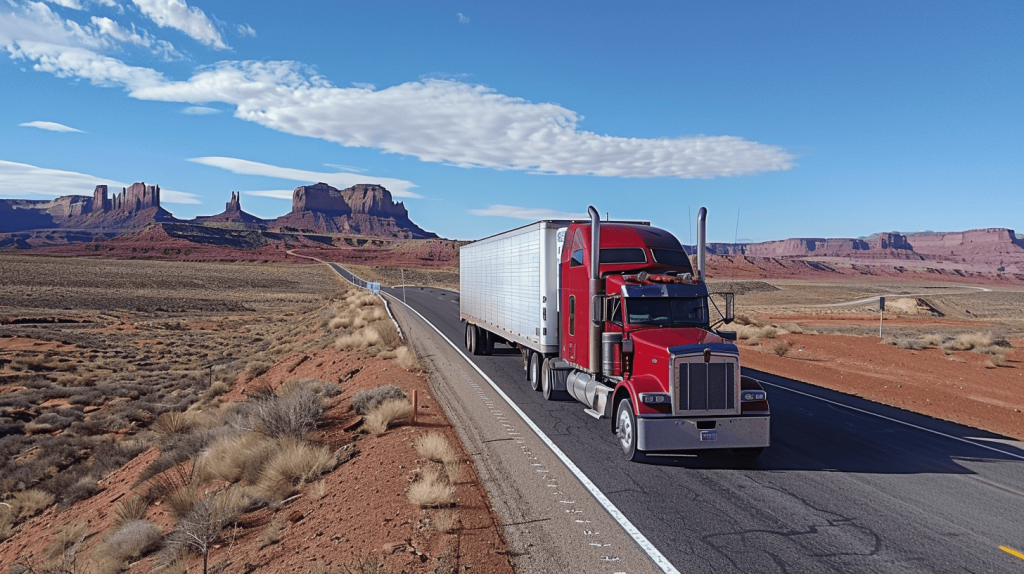Colorado Truck Weight Limits
Freedom Heavy Haul can offer expedited Pickup and Delivery for any size shipment anywhere in the USA. Contact us today for No Hassle, No Pressure Pricing.
The regulations governing truck weight limits in Colorado are essential for maintaining the integrity of roadway infrastructure, ensuring road safety, and promoting efficient transport. These regulations are designed to prevent damage to roads and bridges, minimize wear and tear on transportation infrastructure, and reduce the risk of accidents caused by overloaded vehicles. Understanding and adhering to these limits is crucial for truck operators, freight companies, and all stakeholders in the logistics and transportation industry.
In this article, you will learn about Colorado Truck Weight Limits and Regulations.
Overview of Colorado Truck Weight Limits and Regulations
The state of Colorado enforces specific weight limits for trucks to safeguard its roadways and ensure public safety. These regulations are grounded in scientific research and practical considerations, aiming to balance the needs of the transportation industry with the preservation of infrastructure and the safety of all road users.
Significance of Weight Limits
Weight limits play a pivotal role in reducing the strain on road surfaces and bridges, thereby extending their lifespan and reducing maintenance costs. They also contribute to road safety by ensuring trucks are not overloaded, which can affect their handling and increase stopping distances. Ensuring compliant transport of heavy loads is essential for mitigating these risks.

Height and Width Restrictions
In addition to weight limits, trucks must also comply with height and width restrictions. The legal height limit in Colorado is 14 feet 6 inches, while the maximum legal width is 8 feet 6 inches. These dimensions are set to ensure that vehicles can safely navigate underpasses, bridges, and through tunnels without causing damage or posing a risk to other road users. Choosing the right partner to handle oversized loads can help you stay compliant with these restrictions.
Specifics of Weight Limits
Colorado’s weight limits vary depending on the type of highways trucks operate on, reflecting the differing capacities of interstate and non-interstate roads to handle heavy vehicles.
Interstate vs. Non-Interstate Highways
On interstate highways, the gross vehicle weight (GVW) limit is set at 80,000 pounds, guided by the Federal Bridge Weight Formula. For non-interstate highways, the GVW limit is slightly higher at 85,000 pounds. Understanding these limits and working with experienced services ensures the proper handling of your cargo, while protecting infrastructure and minimizing delays.
Axle Weight Considerations
The weight allowed per axle is also regulated, with a single axle limit of 20,000 pounds and a tandem axle limit of 36,000 pounds on interstates and 40,000 pounds on non-interstate highways. These limits are designed to prevent excessive pressure on any single point of the road surface, distributing the vehicle’s weight more evenly.
Detailed Axle Weight Guidelines
Axle weight limits are a crucial aspect of truck regulations, ensuring that the impact of heavy vehicles on road surfaces is minimized.
Single Axle Specifications
A single axle may carry up to 20,000 pounds, a limit that applies across both interstate and non-interstate highways. This regulation helps to prevent localized road damage and wear.
Tandem Axle Requirements
Tandem axles, or pairs of axles spaced closely together, are allowed to carry more weight: up to 36,000 pounds on interstates and 40,000 pounds on non-interstate highways. Using tandem axles effectively helps spread the load and avoid damage to road surfaces.
Implications for Triple Axles and Beyond
While specific limits for triple axles and beyond are not defined, the overall vehicle weight must not exceed the gross weight limits for the road being used. This ensures that even vehicles with multiple axles do not exert undue pressure on the transportation infrastructure.
Regulatory Framework and Permits
For vehicles that exceed standard weight, height, or width limits, Colorado offers a permitting system to accommodate special circumstances, ensuring that even oversized loads can be transported safely and legally.
Permit Requirements for Oversized Loads
Vehicles exceeding the standard size or weight limits must obtain special permits from the Colorado Department of Transportation (CDOT) or the Colorado State Patrol. These permits come with specific conditions to ensure the safe transportation of oversized loads, including possible restrictions on travel times, routes, and the need for escort vehicles.

Special Considerations for Alternative Fuel Vehicles
Recognizing the environmental benefits of alternative fuel vehicles, Colorado allows an additional 1,000 pounds of gross vehicle weight for trucks powered by alternative fuels, promoting cleaner transportation technologies. Transporting alternative fuel vehicles is easier when understanding these exemptions.
Exemptions for Emission Reduction Equipment
Trucks equipped with emission reduction technology, such as auxiliary power units (APUs), are eligible for a weight exemption. This exemption supports the trucking industry’s efforts to adopt green technologies while ensuring compliance with state regulations. Leverage weight exemptions to maximize your transport capacity while staying environmentally responsible.
Calculating Weight Limits
Understanding how to calculate permissible weight limits for trucks is essential for compliance with Colorado’s regulations. The state’s framework accommodates a range of vehicle configurations and road types, ensuring that the transport of goods remains efficient without compromising the safety of road users or the longevity of infrastructure.
Regulatory Framework and Permits
The regulatory landscape in Colorado is designed to facilitate safe and efficient transportation while protecting infrastructure. For vehicles that do not fit within the standard regulations, Colorado provides a system of permits, ensuring that even oversized or overweight loads can be transported safely.
Permit Requirements for Oversized Loads
Obtaining permits is a critical step for vehicles exceeding standard size or weight limits. The Colorado Department of Transportation (CDOT) and the Colorado State Patrol oversee the issuance of these permits, which are designed to ensure that oversized loads are transported safely across the state. Conditions attached to these permits may include restrictions on travel times, designated routes, and the requirement for escort vehicles, all aimed at minimizing the impact on traffic flow and road safety.

Special Considerations for Alternative Fuel Vehicles
In support of environmental sustainability, Colorado encourages the use of alternative fuel vehicles by allowing an extra 1,000 pounds of GVW. This incentive reflects the state’s commitment to promoting cleaner transportation options without significantly compromising road safety or infrastructure integrity.
Exemptions for Emission Reduction Equipment
Vehicles equipped with emission reduction technologies, such as auxiliary power units, are eligible for weight exemptions. This policy supports the trucking industry’s efforts to reduce its carbon footprint and comply with environmental regulations, acknowledging the added weight of such technologies and compensating for it within the vehicle’s total allowable weight.
Calculating Weight Limits
The calculation of permissible weight limits is a complex process that involves considering the vehicle’s axle configuration, the type of road it will travel on, and specific state and federal guidelines. Colorado utilizes both the Federal Bridge Weight Formula for interstate highways and its own State Bridge Weight Formula for non-interstate roads to determine how weight should be distributed across a vehicle’s axles, ensuring safety and minimizing wear on infrastructure.
The Federal Bridge Weight Formula helps to prevent damage to bridges and roads by limiting the weight per axle and the total weight based on the distance between sets of axles.
Conclusion
Adhering to Colorado’s truck weight limits is essential for the safety of road users, the protection of infrastructure, and the efficiency of the transportation industry. Partnering with experienced heavy haul providers ensures compliance with these regulations while maintaining smooth operations across the state. By understanding and complying with these rules, truck operators contribute to a safer, more sustainable transportation system, ensuring the continued vitality of Colorado’s infrastructure.
Ensuring compliance with Colorado’s truck weight regulations requires attention to detail and a commitment to safety.







